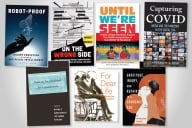You have /5 articles left.
Sign up for a free account or log in.
You shouldn’t judge a book by its cover. Still, it is natural to assume that the title on that cover will give some clue about what is inside. It seems as if a book called Google and the Myth of Universal Knowledge might be very interesting indeed, for it will be about ... well, Google and the myth of universal knowledge. Presumably it will start with Leibniz, who, apart from creating a working prototype of the analog computer in the 17th century, also brainstormed the principle of a new kind of language.
This would not be one more lingua franca, but rather something far more powerful. What Leibniz had in mind was a language that would be, in essence, mathematical -- hence, perfectly rational. Just by translating your question into Leibniz-ese, you would already have more than halfway answered it. (For really tough ones, I guess you’d use his computer.) He didn’t get very far beyond sketching the concept for this language in his notes. But the ambition of it is astounding. It makes the Google search-engine algorithm seem, by contrast, kind of wussy.
Anyway, Google and the Myth of Universal Knowledge would probably be a great book -- one that would be hard to put down. A volume bearing that title has just appeared from the University of Chicago Press. Alas, it bears no resemblance to the one I expected. The author, Jean-Noël Jeanneney, is president of the Bibliothèque Nationale in Paris. He has nothing to say about Leibniz -- nor, for that matter, about the myth of universal knowledge -- and his book is all too easy to put down.
In fact, I did so many times -- even though the argument is clear, and book itself very short. The margins may be called generous, and the text runs to not quite 100 pages, but only if you include both the forward (by a prominent Canadian librarian) and afterward (by the translator). The author mentions that he wrote it in about three weeks, and I will confess to needing almost as long to read it. Much of that time was invested in seeking the will to go on.
The original version was called Quand Google défie l’Europe -- that is, “When Google Challenges Europe.” (A snappy title in the EU, perhaps, but one understands the need to relabel it for export.) Its arguments came to public attention in a newspaper article by Jeanneny appearing a few months after Google announced its book-digitization initiative.
When his much-discussed article first appeared, some commentary in the Anglophone world rendered “défie” as “defies.” Google defies Europe! Very dramatic. That is semantically wrong, and yet not altogether out of tune with the spirit of Jeanneney’s complaints. He may frame things in terms of Europe facing a “challenge” from Google. But in fact his booklet is suffused with, not righteous indignation, exactly, but rather a sense of cultural lèse-majesté.
The whole thing is structured, deep down, by a persistent and astonishingly trite polarity. On the one hand, there is Europe (deep sense of history; respect for social values; passionate sophistication regarding cultural legacy of humanity). On the other hand, there is the United States (no sense of history; free market in total control; gave mankind the cheeseburger). It would appear that these two monoliths are embodied, respectively, by Charles De Gaulle and George W. Bush.
Surely the one must save us from the other -- even though De Gaulle is dead, and cheeseburgers are strangely appealing. Google is a manifestation of the profoundly un-European (or at least un-De Gaullian) cultural logic of free-market capitalism. The future of humanity now depends on the emergence of an alternative.
The announcement of Google’s plan to digitize some 15 million volumes -- most of them in American research libraries “convulsed our daily lives, our activities, and our imaginations,” writes Jeanneney. It appears to have been particularly disturbing because the Bodleian Library of the University of Oxford was also involved.
That, he writes, showed “the familiar Anglo-Saxon solidarity” at work. It is perhaps rare that major developments in the field of library science correspond so closely to tensions in the realm of foreign policy. Rather than see this as an unfortunate but episodic circumstance, Jeanneney finds in it dire signs of cultural imperialism, if not an overt move towards total planetary domination.
xx
The initiative was, for one thing, undertaken by a private company. The algorithms used for Google’s search engines are proprietary, hidden behind a wall of trade secrets. Most of the books to be digitized would be in English -- a situation both reflecting and bolstering that language’s tendency towards global (or at least Internet) hegemony.
This prospect is worrying in ways that the former ubiquity of Latin among educated readers around the world (let alone that of French, until recently) evidently was not. It hardly follows that the dispersion of English automatically yields “Anglo-Saxon,” much less American, domination. It might just as well portend a 21st century of explosive economic and cultural innovation coming from India or the Caribbean.
But I am rude to interrupt the worries of M. Jeanneney. So to continue:
The ranking of search results from Google tends to reflect the popularity of whatever links are followed by the search-engine’s users. That is another sign of Google’s market-like logic. (It would be preferable for results to correspond to the cumulative wisdom of the learned.) But the effects of the profit motive may run even deeper.
“What pays for the digitization of materials,” writes Jeanneney, “are linked advertisements from companies that have an interest in associating their image with old or recent works likely to promote that image. As a result, books will necessarily be hierarchized in favor of those best suited to satisfy the demands of advertisers -- again, according to the principle of the highest bidder.” This conjures a future in which people will be able to search the pages of Proust only thanks to the sponsorship of a manufacturer of madeleines, or read only read a digital Don Quixote amidst pop-up ads from somebody trying to sell you a windmill.
“Am I exaggerating?” he asks. “Can we be sure this won’t occur?”
Well, few things in life are sure. And those that are -- death, for example -- seldom prove encouraging. Be that as it may, the commercial dynamics of Google are nothing compared to the real horror that Jeanneney imagines for the future.
It seems that during an event held in Paris to celebrate the bicentennial of the French revolution, Jeanneney was exposed to a skit by Bob Hope. The details are unclear, but it sounds as if there were a lot of jokes about guillotines. Any American old enough to remember Bob Hope can imagine that the performance could only make you laugh from pity at how lame the whole thing was.
In any case, the experience must have been traumatic for Jeanneney. He is convinced that future generations of the Republic’s schoolchildren will have their minds warped by googling “Jacobins” and getting Anglo-American accounts not much more sophisticated than whatever hilarious hijinks involving a guillotine were performed that day.
One longs to assure Jeanneney that, no, Bob Hope did not reflect anything like an Anglo-American scholarly consensus on the aftermath of 1789 and that the Revolution was never defended more strongly than by, say, the late Morris Slavin, a professor of history at Youngstown State University who died a few months ago.
That’s assuming, of course, that the Republic’s schoolchildren will be using Google to study historiography rather than to keep up with the Eurovision song contest. (You can blame “the familiar Anglo-American solidarity” for a lot of things, but not for the Eurovision song contest. We have no global monopoly on the production of cultural crap.)
Before assuming his current position in charge of the national library, Jeanneney served in a variety of government positions. His booklet is the work of a capable political functionary -- in essence, a memorandum festooned with the occasional erudite quotation. The intent is to persuade people in the European Union to commit to a serious, coordinated development of alternatives to Google, both at the level of digital collections and search tools.
If that means employing rather dumb clichés that will help some readers enjoy an unearned feeling of cultural superiority to their boobish American cousins -- well, so be it. The citations from Plato and Diderot are there strictly to dazzle the rubes. The important thing is to get a budget together.
When he leaves off the bouts of stereotype-laden geopolitical grumbling, Jeanneney does make some good points. “In 2006,” he writes, “we can’t help but be struck by the number of projects Google is showcasing, and this gigantic appetite will only be satisfied if its exceptional profitability continues to satisfy Wall Street. But there’s no certainty whatever that it will continue....”
This is all the more worrisome given the company’s “apparent indifference to the question of long-term preservation and conservation....The instinct to preserve a cultural heritage, by contrast, is intrinsic to public institutions with a lofty mission, for which government funding ensures steady budgets or even, in the best of cases, periodic increases.”
Similar thoughts may form in an American brain. Developing both a digital archives and a non-Google search engine is something scholars in the United States would welcome. Let every important work ever stored in a Bulgarian or Rumanian library be scanned, and fully indexed, and made available to anyone on the planet capable of reading them. And if Jeanneney knows how to harness the brainpower of the EU’s intelligentsia so that only really smart items will result from an Internet search, then more power to him.
Yet one notices certain things about how he appeals to his European readers. He talks about the civilizing mission of the European spirit, etc. But he does not forget what is sometimes called, in the market-crazed world of the Anglo-Saxons, “the bottom line.”
The proposed European Digital Library would benefit humanity through the sheer force of its non-American-ness. But it would also, he notes, enhance the EU’s economic power.
Nor, it seems, would the initiative be entrusted solely to “public institutions with a lofty mission.” Unless IBM is one of them, that is. He mentions that the company is serving as a consultant to the European Digital Library project – helping to get “competitive bids from those companies that might hope to obtain part of the European market.” For many years, Jeanneney held appointments under Francois Mitterrand. But at times, he sounds quite a bit like what, in the United States, was once called a Rockefeller Republican.








